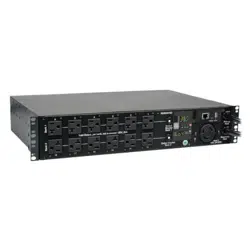Loading ...
Loading ...
Loading ...

25
5. CLI Commands
apply
apply network
Use the apply network command to apply network-specific changes, which includes changes to Internet settings, DNS and
network services. Applying network changes may require terminating all active user sessions. Ensure that all network changes
are made prior to applying them.
Syntax
apply network
Examples
The following command applies any changes made to network settings:
console> apply network
Applying changes to network settings on the device. Note that this may cause a system
reboot.
autoprobe
autoprobe
Use the autoprobe command to create and manage automatic network probe (AutoProbe) entries. The probe type must be
specified when creating a new action. The available choices are “probe an NTP server” (ntp), “ping a network device” (ping)
and “perform an SNMP GET” (snmp). If snmp is chosen as the probe type, the SNMP version must be specified – v1, v2 or
v3. Use the no form of this command to delete the entry. When creating an entry, select an easily remembered name as a
label for the entry; this name will be used in the command format autoprobe <probe-name> when configuring the entry’s
status and settings. To exit from the autoprobe <probe-name> command format, use either the end or exit commands.
Refer to the event command for configuring an AutoProbe entry as an action trigger. Once this has been completed, refer to
the action command for assigning an action to the AutoProbe event.
Syntax
autoprobe <probe-name>
• probe-name – Specifies the probe entry to be managed.
autoprobe <probe-name> {ntp | ping | snmp {v1 | v2 | v3}}
• probe-name – Specifies the name of the probe to be created. If spaces are required, bookend the name with quotation
marks (“).
no autoprobe <probe-name>
• probe-name – Specifies the probe entry to be deleted.
Examples
The following command creates “Probe Get” as an SNMP (version v3) GET probe entry:
console> autoprobe “Probe Get” snmp v3
Created Probe Get
console> autoprobe (Probe Get)>
The following command deletes “old probe”:
console> no autoprobe “old probe”
Deleted old probe
Loading ...
Loading ...
Loading ...
